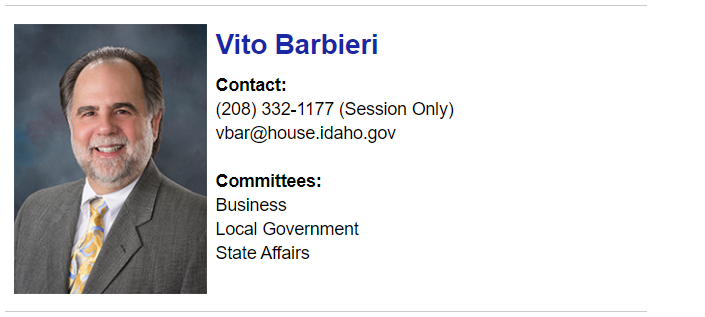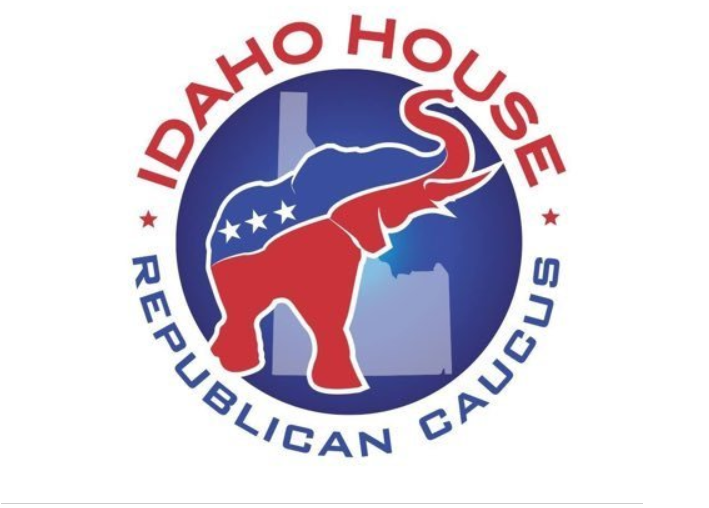
Some information on the current recess and date of return for the Legislature.
Representative Vito Barbieri – District 2
Dear Friends,
Below is some information on the current recess and date of return for the Legislature. For more details, you can log onto legislature.idaho.gov where you will find bills, committee recordings, and live stream videos of our House and Senate floor sessions. I look forward to your involvement.
Sincerely,
Vito Barbieri

Legislature will return from recess on April 6th

Due to an increase in confirmed COVID-19 cases in the Idaho House of Representatives, House leadership immediately shut down committee meetings last week. It urged the Senate to concur with their request to recess until Tuesday, April 6. There are currently no senators with COVID-19.
Article 3 of the Constitution allows the legislature to recess upon agreement through the concurrence of both bodies. The Senate has researched the legality of pausing legislative activities through the next two weeks without risking the legislature’s ability to continue its work, should it reconvene.
There is precedent for an extended recess. In January 2000, the legislature took a two-week recess following the unexpected death of then Senate President Pro Tempore Jerry Twiggs.
“We are saddened to hear about the increase in cases in the House. The Senate has always understood the seriousness of COVID-19, but we respect the oath and obligation we have to do the important work of the state, and while mindful of the risks to us personally, we remain focused on the work ahead,” said Senate Majority Leader Kelly Anthon. “We are committed to finishing the people’s business but also respectfully support our House colleague’s request. We will also make sure this legislative pause is done in a way to prevent unnecessary expenditure of taxpayer dollars.”
Significant issues such as transportation funding and tax relief still need to be addressed and resolved. The Senate had already been planning for a potential recess to deal with the uncertainty on how to use the roughly $2 billion the state will receive from the American Rescue Plan Act.
“This recess still gives us time to plan for the best use of these incoming dollars to support and strengthen our state and protect our citizens. It will also give us more time to assess the impacts, requirements, and expected timeline associated with those dollars from the U.S. Treasury,” added Anthon.

The Gem State’s government
- The Idaho Legislature is tied with South Dakota’s Legislature for the 12th-smallest number of legislators at 105
- The latest adjournment date of the past 20 regular legislative sessions was May 8th in 2009
- The Idaho Legislature combined with the Governor’s Office makes up 1 of the 21 Republican state trifecta governments in the US, in which Republicans control both chambers and the governorship
Legislation at a Glance:
H0026: This legislation would eliminate the use of the habitual status offender definition and prevent status offenders from being detained in secure facilities instead of juvenile shelter care facilities. The bill passed the House and Senate and was signed by the Governor on March 8. The new law will become effective July 1, 2021.
H0332: This legislation would reduce all income tax brackets and provide a one-time sales tax/income tax rebate for Idahoans. The bill passed the House with a vote of 58-12-0 and was introduced to the Senate.
HJR004: This proposed constitutional amendment would prohibit the legalization of controlled substances unless approved by a two-thirds majority vote of the Idaho Legislature. The bill passed the House State Affairs Committee with a Do Pass recommendation and is scheduled for its Third Reading in the House.
S1006: This legislation would consolidate current statutory requirements for literacy intervention and update provisions in alignment with the Task Force recommendation for focusing on the importance of having every student reading at grade level by the end of grade 3. The bill passed the Senate with a vote of 35-0-0 and was introduced to the House. It was referred to the House Education Committee and passed out of Committee with a Do Pass recommendation. It is scheduled for its Third Reading in the House.
S1009: This bill would include the State Fire Marshall and State Fire Marshal deputies in the same definition as firefighters under the Public Employee Retirement System. The bill passed the Senate with a vote of 32-1-2 and was introduced to the House. It was referred to the House Commerce and Human Resources Committee and received a Do Pass recommendation. The bill passed the House with a vote of 67-1-2 and was delivered to the Governor.
S1017: This bill revises definitions involving uniform controlled substances to make technical corrections in order to include synthetic drugs. It also provides corrected terminology and provisions for controlled substances. It clarifies the definitions and identifies the differences of marijuana and CBD that are approved by the United States Food and Drug Administration (FDA). The bill passed the Senate and the House and was signed by the Governor.
S1027: This legislation would compensate individuals who were wrongfully convicted and imprisoned with $62,000 per year of incarceration or $75,000 per year if incarcerated on death row. Those who were put on the sex offender registry wrongfully would receive an additional $25,000 per year on the registry. Exonerees would be given a two-year window to file a claim from the moment they were formally exonerated by a court. The bill passed the Senate and the House and was signed by the Governor on March 5. It became effective the same day.
S1039aaH: This bill would allow school districts to award a Workplace Readiness Diploma to graduates who have completed career technical education programs. The bill passed the Senate with a vote of 33-0-2 and was introduced to the House. It was referred to the House Education Committee and passed out of committee with a Do Pass recommendation. From the Floor, the bill was placed on General Orders by unanimous consent. It was amended and reported out without recommendation and is scheduled for its Third Reading.
S1069: This bill would clarify Idaho law on absentee ballots by requiring clerks to contact a voter in any case where their absentee ballot cannot be counted to resolve the issue by 8:00 PM on the day of the election, after which it is impossible to count the ballot. The bill passed the Senate with a vote of 35-0-0 and was introduced to the House. It was referred to the House State Affairs Committee.
S1110: The purpose of this legislation is to increase voter involvement and inclusivity in the voter initiative/referendum process. This will be accomplished by ensuring signatures are gathered from each of the 35 legislative districts, so every part of Idaho is included in this process. The bill passed the Senate with a vote of 26-9-0 and was introduced to the House. It was reported out of the House State Affairs Committee with a Do Pass recommendation and is scheduled for its Third Reading.
S1134: The purpose of this legislation is to amend Idaho Code 46-1005A by inserting language allowing for the recovery of federal funds after a Declaration of State Emergency has expired or was terminated. The bill passed out of the Senate 34-0-1 and was introduced to the House. It was referred to the House State Affairs Committee.
S1139: This legislation clarifies the definitions of “quarantine” and “isolation” and adds definitions for “biological agent,” “chemical agent,” “medically unknown symptoms,” and “restricted access” in Idaho Code 56-1001. It also clarifies the powers of the Director Health & Welfare in Idaho Code 56-1003 as it relates to the promulgation of rules and issuing of orders of isolation, quarantine, and restricted access. Additionally, it adds language to allow for a request to the courts for review of an order issued by the Director. The bill passed the Senate with a vote of 33-0-2 and was introduced to the House. It was referred to the House Health and Welfare Committee. It passed out of committee with a Do Pass recommendation and is scheduled for its Third Reading.
